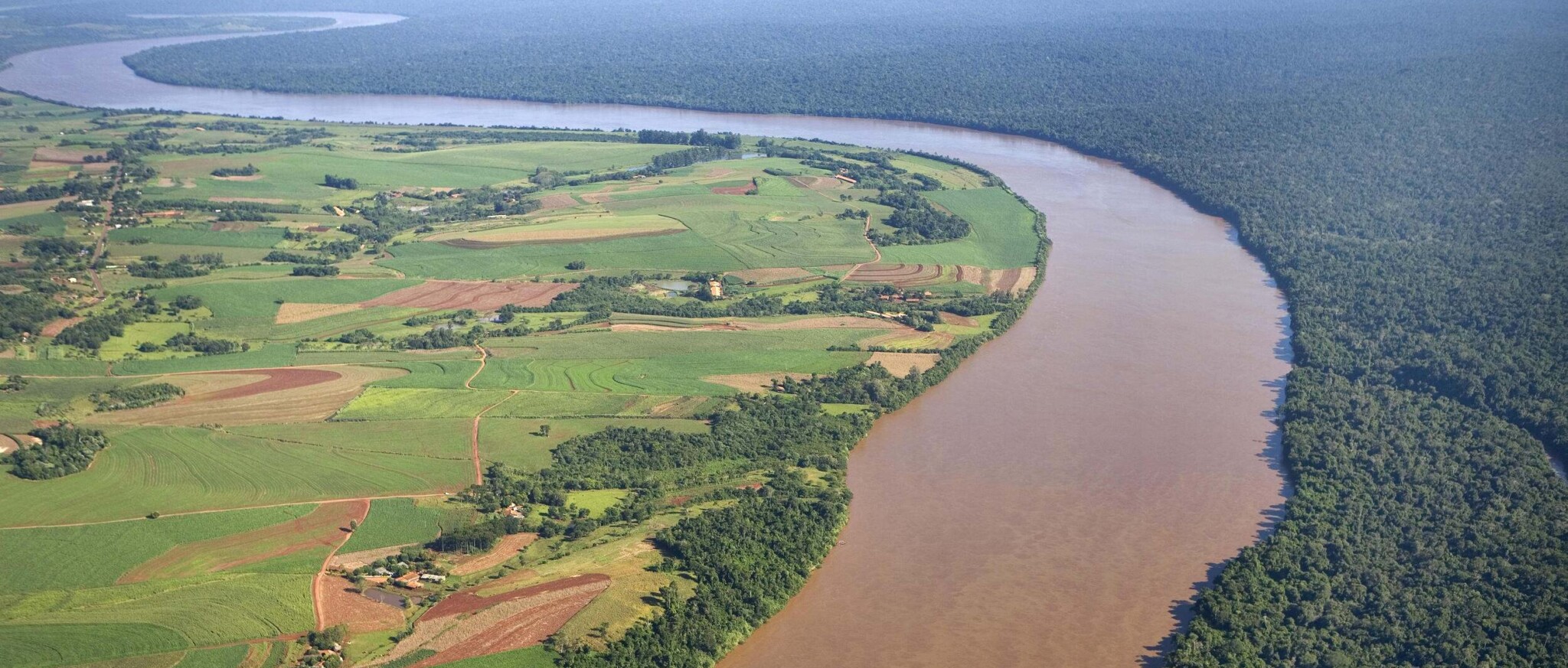
The aerial view shows farms and crop fields east of Foz do Iguaçu, with the Iguaçu National Park to the right. This park, amidst the deforested Paraná river valley, is a haven for endangered species like the giant otter and ant-eater. Copyright © Scott Warren
Money is moving in the wrong direction. Flows of finance driving nature destruction overwhelm the amount of capital that’s going towards mitigating climate change and protecting nature.
Annual finance flows from public and private sources that have a direct negative impact on nature are estimated at almost $7 trillion per year. This is more than 35 times the amount of finance flowing into nature-positive investments.
This represents an increasing threat to financial institutions’ fiduciary duty – their ability to act in the best interests of their beneficiaries.
We need to turn this around. Fast.
Just as financial institutions need transition plans for their journey towards a low carbon economy, so too do they need roadmaps to redirect finance away from activities that destroy nature and towards those that support a sustainable economy with thriving ecosystems.
Those that succeed will reduce significant operational, regulatory, physical, market-related and reputational risks, and open the door to new opportunities to finance sustainable commodity production and nature-based solutions.
With the legislative environment rapidly shifting to support finance to make its low carbon, nature positive transition, mandatory nature-related disclosure on the cards, and an ever more robust and set of data and tools, the race is on to build finance sector leadership that ends deforestation – and land degradation – and restores and protects nature.
At Nature4Climate we work with groups and organizations leading this charge. Their ambitions, efforts and solutions are highlighted below.
Ending deforestation, which causes 11% of global emissions and sits at the heart of climate, nature, food security and human rights challenges, and land degradation, must be an early and central part of financial institution’s transition plans.
As Niki Mardas from Global Canopy and James Lloyd from Nature4Climate explain in this interview, major wins will come from shifting funds to protect and restore forests, and members of US$ 8 trillion Finance Sector Deforestation Action are fast working to eliminate agricultural commodity driven deforestation from their portfolios and scale finance to nature-based solutions.
For example, Storebrand provides a comprehensive overview of its approach to tackling deforestation, from designing a policy to delivering real-world impact. They show how existing datasets like Trase and Forest 500 can be effectively employed to map deforestation risk and select companies for priority engagements.
Ongoing engagement work with the automotive industry and with agricultural traders is detailed, along with evidence of how joined-up action is already delivering results in the Brazilian soy and Norwegian salmon industry.
Storebrand explain how integrating deforestation into the investment processes is an essential part of risk management and can be a highly rewarding and productive project.
Leading Brazilian investor JGP detail their efforts to eliminate commodity-driven deforestation through active ownership, creative financing, and nature restoration.
They show how targeted investments in companies directly exposed to deforestation, companies that buy products from deforestation, and those that finance deforestation combined with focused engagement activity can drive increased transparency, pushing for robust guidelines, more sustainable production chains and an accelerated food transition.
In this case study, Aviva explain the fundamentals of their in-depth deforestation risk assessment across all investment and underwriting activities. They show how they used Global Forest Watch satellite imagery on near-real time monitoring of deforestation across the globe to assess real assets, annuities, sovereign debt and general insurance activities. They also describe how they used the Deforestation-Free Finance Roadmap across corporate engagement efforts to suggest tools, advise on policies, and educate banks on how best to implement efforts to tackle deforestation, and provide details of their engagement with the Bank of Montreal.
The Church Commissioners describe how their deforestation policy encourages investee companies to make quantifiable, time-bound commitments to eliminate deforestation from their activities and their supply chains, and shows how they are working with policymakers to help shape deforestation regulation and legislation.
When it comes to scaling finance to nature-based solutions, this event synopsis shows how Schroders, Clarmondial, BTG Pactual Timberland Investment Group, and Climate Asset Management are overcoming a number of key challenges to provide solutions, and in this comment piece, Schroders ask if it is really possibly to finance nature at scale.